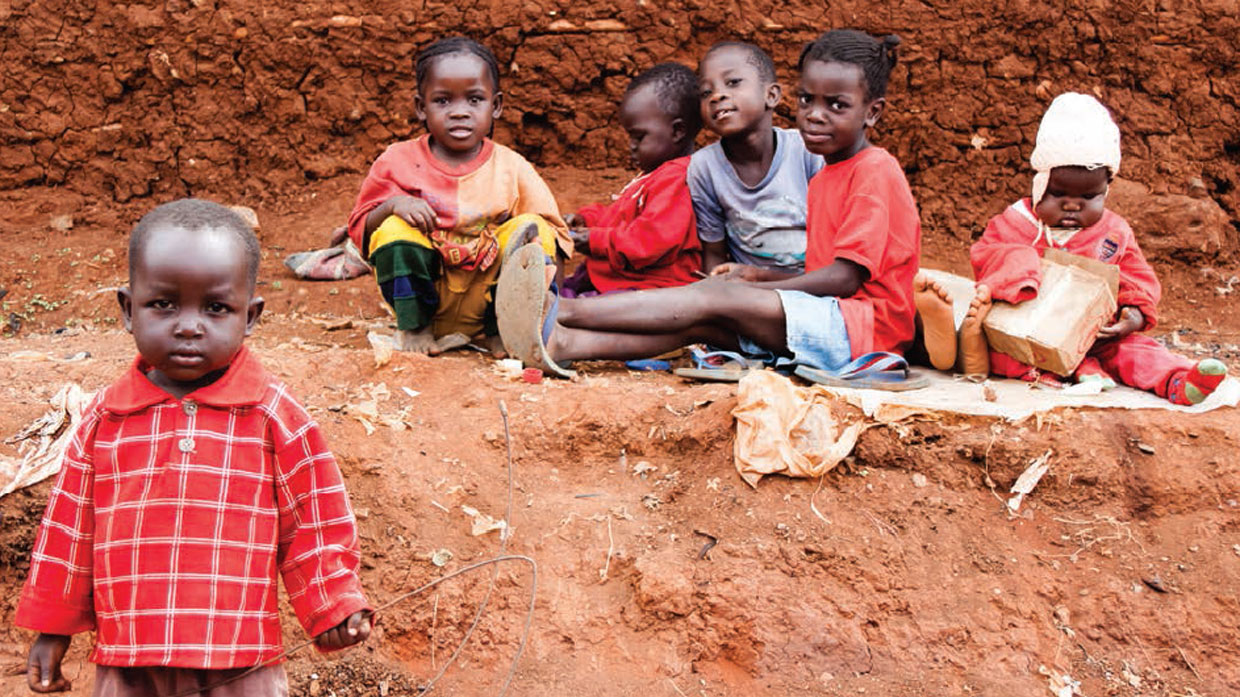In this series: Thinking Biblically about Mission Trips
Faithfulness in ministry isnt just keeping the doors of the church open, hoping people will walk in. It means finding ways to take the good news to them, whether they are in another neighborhood, subculture, language group, or country. The articles in this Common Challenge will help you extend your ministry to those who need it most.

I owe my life to missionaries. Growing up as an orphan in rural Kenya, missionaries—some long-term, some short-term—intervened at key junctions in my life.
Missionaries helped start the children's home that saved me from being destitute. Missionaries sent some of my most beloved friends, mentors, and supporters to my doorstep. And through the years I learned the difference between mission teams that helped and those that didn't. Perhaps my story will be a tool for your own discernment as you reach out to others.
For the first time, I saw what it was like to be the one offering help.
I lost my father at a young age and was soon abandoned by my mother as well. So at the age of 11, I lived with my 13-year-old brother and 5-year-old sister. We found ways to survive, selling plastic bags of water to earn money for food. But we regularly dropped out of school.
My life changed when a pair of pastors—one Kenyan, one American—started a children's home. When I was able to live there, I knew my life had changed forever. One day, after a few years of living there, I met two young American women who were traveling through the area. They had blonde hair that hung in their eyes, and they talked to me in a grown-up way I'd rarely been talked to before.
They lived at my orphanage for a year, starting a non-profit called Hope Runs, and ultimately bringing me to the United States. The book Hope Runs: An American Tourist, a Kenyan Boy, a Journey of Redemption tells the story of the strange, makeshift family we have formed.
At first, though, I was wary of them, and so were my friends. Living in an orphanage, I'd had many experiences with missionaries who came to help over the years. Some had done just that, ultimately changing my life and the lives of my peers. Some had only added to our hardship (more on that later). White people—mzungus, as we call them in Kenya—had not always been the best visitors. What would it be like to have this pair of girls around for so long? With time, though, I grew to know, trust, and love them.
Over time, I understood in a way that many of my friends did not, that mzungus couldn't drop their lives in the U.S. to live with my friends and me in our orphanage. I saw, eventually, that sometimes good things could happen in those few days when missionaries were there.
Years later, I would gain a much more comprehensive perspective. When I came to start high school in the U.S., I felt that my American peers saw me like the missionaries did—like a needy orphan. With time, though, I learned to walk and talk and think like my new high school friends around me. Most important, I learned what it meant to be able to extend resources to others.
Focus less on "helping," and more on cross-cultural exchange.
In my senior year of high school, I ran a campaign that made the local news, collecting thousands of pairs of running shoes for my peers in orphanages back home. The year after high school, I took this concept of service a step further and spent a year volunteering on a service project in Ecuador. For the first time, I saw what it was like to walk into a community and be the one offering the help.
Although these experiences have given me a more complete perspective on missionary work than I ever had growing up in my orphanage, many of the thoughts and feelings I had as a child about the strange white people that came to visit still ring true. Here are five things I have learned about being a good missionary from being on the other side, the side of the beneficiary, the one being helped.
1. Rethink the goals of your short-term mission trip.
In the orphanage, I saw many short-term missionaries come and go. Again and again I was amazed by how many of them were completely focused on "getting things done" during their time with us. Whether it was building a chicken coop, painting the dorm rooms, or fixing a borehole, many missions teams spent the few days they were with us doing, doing, doing. And most of the time, the doing was manual labor or unspecialized work.
I was thrilled they wanted to help us, but I always wondered about the particular activities they chose. In Kenya, for example, we have rampant unemployment, and there is literally an endless supply of Kenyans who would do such menial labor for very little money. If a missionary is going to spend so much money to fly and visit us, shouldn't they be doing work that only they can do?
Again and again, I found that the missionaries I most connected with were those who realized this fact. They saw that the thousands of dollars they had spent to come visit us could be best used in building relationships, both with the students in our orphanage and with the elders as well, not in painting, building, or manual labor that Kenyans could do.
It was in these relationships—when I learned about the wider world, got to practice my English, and built some key connections that would last a lifetime—that I saw the real benefit to having short-term missionaries come to the orphanage.
If there is one thing I could tell short-term missionaries, it would be this: focus less on "helping," and more on cross-cultural exchange, and becoming friends.
2. Don't try to get too close too fast.
I'm still a teenager, so I can't speak with the authority of a psychologist on this, but from what I have read about orphaned and vulnerable children who grow up in situations similar to mine, I know that there are problems with attachment that come when you're raised like I was.
Try to remember that the trip isn't over when you get back home.
Although I loved seeing missionaries get close quickly with many of the kids at the orphanage, I sometimes worried about the younger, more emotionally vulnerable children. There were many young girls and boys at my home who would latch on quickly to a missionary who was only there for a few days—holding her hand and not letting her out of their sight for 72 hours. And then they'd be devastated when she inevitably left.
I want short-term missionaries to show love and care, but it's important to be aware of this difficult reality and to proceed carefully, knowing that you—the missionary—are the adult in the situation. Kids are particularly vulnerable to short-term visitors, and they often don't understand the reality of your life back at home and why you really have to leave after a few days. It may not be fair to you that a kid is disappointed when you only stay a week (which is a long time off work for you!), but as I saw again and again, many of my peers just didn't understand the concept of traveling so far for such a short time. These visits can be good, but proceed with caution.
3. Learn what the partner needs.
One day I was coming back from running practice, and the bell in the dining hall rang, meaning that all 170 children at my orphanage were supposed to gather together into the central courtyard. When we did, we came face-to-face with 20 smiling mzungus.
After one of our elders introduced the group, she said that the mzungus had a presentation for us. A middle-aged American woman with a bottle of hand sanitizer strapped to her waist gave a 15-minute talk about how to brush your teeth. Then she passed out toothbrushes.
We couldn't stop laughing. Another white person who thinks we don't know how to brush our teeth!
As we filed into the dining hall afterwards, we couldn't stop laughing. "Another mzungu who thinks we don't know how to brush our teeth!" We added the new toothbrushes to our stockpile. We had dozens, of course, from all the other white people who had come through that year apparently concerned primarily about our teeth.
The lesson here is that understanding what a partner needs is essential if you're trying to offer valuable support. In this case, the group was at our orphanage for only a few hours, and they assumed that in that short time it made the most sense to focus on tooth brushing. They were wrong. Ask, ask, and ask again.
4. Don't forget the money.
People don't like to talk about money, but when it comes to orphanages that constantly struggle financially, we have to. Of the many problems related to short-term missions that I saw play out again and again, problems with money and a lack thereof topped the list. Here's a classic example:
After months of coordination between the orphanage and a U.S. church, a group of 10 comes from the U.S. and stays for four nights in some extra dormitory rooms. The orphanage van (the only vehicle) goes on an 8-hour round-trip journey to pick them up at the airport, and another 8-hour trip to drop them off at the end of their stay.
They bring with them a dozen bags of donated clothes and books. During their time at the orphanage, they are served special meals with things we kids don't get to eat—meat, fresh vegetables, milk, and sugary treats. During their stay, the three full-time staff at the orphanage are on-call the entire time, helping with the constant questions and issues that always come up when people travel to an unknown (and, to them, primitive) place. The orphanage takes the group on frequent rides to local shopping centers, tourist places, hospitals, and the like every day. When the group departs, they may leave a donation of $2,000.
From the church's perspective, they have fundraised incredibly hard and already spent more than $30,000 to bring a group of 10 to Kenya. For them it seems reasonable to make a donation of $2,000. The orphanage, in contrast, feels exhausted, used, and frustrated. That $2,000, even in Kenya, is not a lot of money to pay for all of the orphanage's expenses and staff time. Three years later, the orphanage hears from the group again, saying they had such a great time, they want to make another trip.
There are variations on this story. Sometimes the group leaves no money at all. Sometimes the orphanage never hears from the group again. Sometimes the group promises a large donation or offering upon returning home and showing their photos and videos to the congregation, but it never materializes. And sometimes, of course, a church becomes a long-term partner. But long-term partnerships are the exception.
Year after year, the cycle continues. The orphanage accepts short-term missionaries because it is always hoping for that long-term partner who can really help. In the interim, though, they are using up resources that should be going to the children on an endless stream of visitors.
If you're a church considering a short-term missions trip, please think about the implications of the time and resources the orphanage will spend on you.
5. Follow up, follow up, follow up.
What a missionary does once he or she goes home is often far more important than what happens at the site. Following up is everything.
When I talk about some of the great relationships I built with short-term missionaries over the years, I know that the only reason those relationships worked was because the missionary followed up. As an orphan, I didn't have money for a stamp to send a letter (and Internet access, both then and now, is unusual in many children's homes in Kenya). But if a person I met wrote me, we could develop a friendship. Some of my greatest mentors and friends to this day are people who first came for just a few short days to my orphanage. On the larger scale, follow up is the only way that the orphanage and the church can truly build a mutually beneficial long-term partnership.
Ultimately, try to remember that the trip isn't over when you get back home.
In the years since I left the orphanage and began to have experiences of my own helping others, I've learned a lot about what it means to extend help and how difficult it can be. Aside from my year spent on a service project in Ecuador, I've also now taken part in several short-term volunteer experiences with international missionaries visiting orphanages and nonprofits in Kenya. In all of these experiences, I've served as a bridge, the rare person who knows both sides, and who tries to provide advice on how each side can better understand the other. I'm glad that the missions field has changed to emphasize understanding on-the-ground partners, but there is still much more work to do.
I believe the core of the issue has to do with better communication between missions groups and partner sites, in hopes that we can bridge the vastly different cultural and financial expectations and assumptions that each group has.
By working closer, we can help one another.
Claire Diaz-Ortiz is Twitter's manager for social innovation and coauthor of Hope Runs: An American Tourist, a Kenyan Boy, a Journey of Redemption (Revell, 2014). Claire is the cofounder of Hope Runs, a nonprofit organization operating in AIDS orphanages in Kenya.
Samuel Ikua Gachagua was born in rural Kenya in 1992. After losing his parents at a young age, he struggled to survive until he was placed in an orphanage in Nyeri, Kenya. In 2009, he received a full-ride scholarship to Maine Central Institute, granting him a rare U.S. visa and the chance to begin his sophomore year of high school under the guardianship of Claire Diaz-Ortiz. After graduating from high school, he spent a year serving in Ecuador as a fellow for Global Citizen Year. He is an up-and-coming motivational speaker.
Copyright © 2014 by the author or Christianity Today/Leadership Journal. Click here for reprint information on Leadership Journal.













